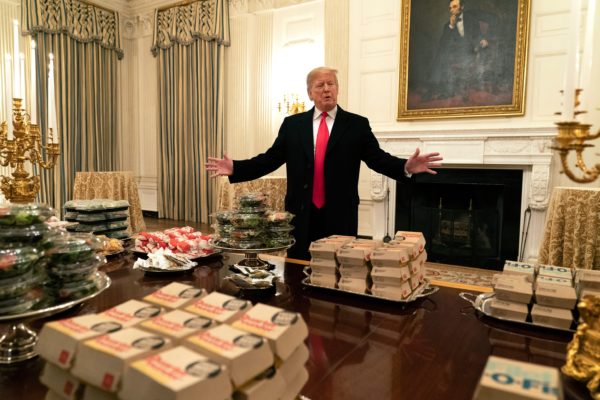The restaurant community was abuzz last week when industry executives convened in the White House for a roundtable discussion with President Trump to address the impact of the COVID-19 crisis on our business. As to be expected in such Trump-sponsored gatherings, the members of this “task force” seemed keenly aware that addressing the President requires visitors to properly supplicate themselves.
As is also customary in the Trump White House, the panel was carefully curated to limit women and people of color. Neatly-suited white men seem to be the only people worth consulting in moments of crisis. In fairness, a tattooed chef-owner from Williamsburg might have looked silly sitting next to Jared Kushner and his meticulously-manicured cuticles.
It was no coincidence that other more well-known restaurant owners—like Jose Andrés, Tom Colicchio or David Chang—were not invited because they’ve all openly criticized the Trump Administration. No one in attendance at the restaurant roundtable dared question the alacrity of the Administration’s response or why moribund businesses like the airline industry are prioritized over ours.
The attendees had presumably given ample assurances to temper any partisan messages on Trump’s home court. The only surefire way to gain Trump’s favor is to “play the game.” But what’s the point a game that’s rigged before the ref even blows the whistle? Trump only plays with a stacked deck.
We heard from Trump’s billionaire pal Tillman Fertitta—apparently once Trump’s commercial tenant—on behalf of his expanding multiplex of restaurant chainlets, Landry’s. Fertitta, who Forbes calls “The World’s Richest Restaurateur,” has spent the last ten years amassing billions by devouring smaller regional restaurant groups across the country. The bulk of his company’s revenues comes from such distinguished American franchise names as Bubba Gump Shrimp Co. and Rainforest Cafe.
Fertitta’s origin story may be more compelling than Trump’s, but as a businessman he’s cut from the same cloth. Like the Trump Organization, Landry’s aggressive international expansion, mainly through leveraged buyouts, is about dominating marketplaces and strangling the competition.

Then we were treated to Thomas Keller explaining the nuances of seasonal butters to President Trump, like a table-side conversation that Chef Keller might have with one of his affluent patrons at The French Laundry. The moment encapsulated how alien the restaurant world can seem to people who don’t understand it, and how casual they feel toward our demise. We came to discuss serious bank loan terms and instead we got caught in a discussion about boutique dairy products.
The butter conversation hints at something more troubling beneath the surface about the restaurant industry’s current predicament. Our seat at the table is a reflection of the power imbalance we face on a daily basis in hospitality. Considering the existential threat to our industry, it was hard to watch our representatives sucking up to Trump and his cabal of yay-sayers. But it looked hauntingly familiar. This is what we do in our restaurants everyday.
Those of us who work in the industry know all about catering to affluent patrons. We pack our wine lists with “status wines” to siphon corporate dollars. We charge astronomical sums for grotesquely large cuts of beef, meticulously dry-aged and wrapped in whiskey-soaked bandages. The reward is that we get to live off the crumbs they leave behind. These can often be very tasty crumbs, which makes it easy to forget that we never get to order our own entrées.
The symbiotic relationship the restaurant industry has with the financial sector has become increasingly pornographic. Banker bros invest heavily in trendy restaurants because it gives them cache when they wine and dine their friends. Expense accounts have become a revenue stream that high-end restaurants rely on too much (See: The 2008 Financial Crisis).
If this pandemic has taught us anything, it’s how tenuous that economic calculus can be. Restaurants have always been a high-risk, high-reward investment. The COVID-19 pandemic will likely make any restaurant investors think differently about that risk. It would certainly be compelling to see what our industry would look like without being propped up by investment bankers who only see us as playgrounds for their Patagonia pals.
No one is arguing that the restaurant roundtable participants aren’t serious about doing what is necessary to “save” our industry. Everyone who attended acutely understands the perils we face without sustained federal support. It’s just unfortunate that they needed to tailor their message to fit Trump’s narcissism.
But it isn’t a surprise. This is what we’re always expected to do in the restaurant industry. We enable the sanctimonious ways of the people we serve. The wealthier you are, the more willing we are to accommodate you. So when we need help, is it too much to ask that they show us the same consideration? That isn’t what happened at The White House last week.


[…] Trump Adminstration’s outreach, not unexpectedly, prioritizes corporate interests. His task forces on reviving restaurants have been comprised primarily of C-level parrots. These companies are not immune to the devastating […]
[…] participated in the Administration’s “Great American Economic Revival Industry Groups” and White House roundtables. Independent restaurateurs have been largely excluded from those meetings, as have women and people […]